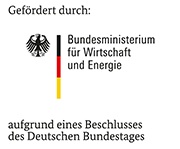
| Period: | 01.11.2001 - 30.04.2004 |
|---|---|
| Partner: | - |
| Funder: | Arbeitsgemeinschaft industrieller Forschungsvereinigungen e.V. |
| Project Manager: | Dr. Claudia Weidlich |
| Research Group: | Electrochemistry |
Aims
The aim of this project was the implementation of a new water softening technique based on an electrochemically switchable ion-exchanger consisting of conducting polymers. This ion-exchanger can be regenerated without water electrolysis or the addition of chemicals.
Working plan
We investigated the ion-exchange behaviour of different modified conducting polymers and tested them in laboratory loops as well as in practical operation. A special cell configuration has been developed to allow a continuous water softening process. The ion-exchange capacity and selectivity have been optimised and the results were compared to conventional ion-exchangers. Long-term investigations showed the applicability and stability of the ion-exchanger. For application in drinking water softening the non-polluting and non-toxic properties of the ion-exchanger material have been checked.
Results
Conducting polymers exchange ions during charging and discharging processes. Polypyrrole with polystyrenesulfonate counterions (PPy/PSS) works as an electrochemi-cally switchable cation-exchanger. A conductive carbon fleece loaded with PPy/PSS was polarised in a laboratory loop. The calcium concentration in the loop, measured with a calcium-selective electrode, changes in dependence on the potential of the PPy/PSS ion-exchanger electrode. The results show decreasing calcium concentration during negative polarisation because Ca-cations are absorbed into the reduced polymer. During positive polarisation the concentration of the solution increases since Ca-cations are released and the cation-exchanger is regenerated.
back
Das IGF-Vorhaben Nr. der Forschungsvereinigung DECHEMA e.V., Theodor-Heuss-Allee 25, 60486 Frankfurt am Main wurde über die AiF im Rahmen des Programms zur Förderung der industriellen Gemeinschaftsforschung (IGF) vom Bundesministerium für Wirtschaft und Energie aufgrund eines Beschlusses des Deutschen Bundestages gefördert.